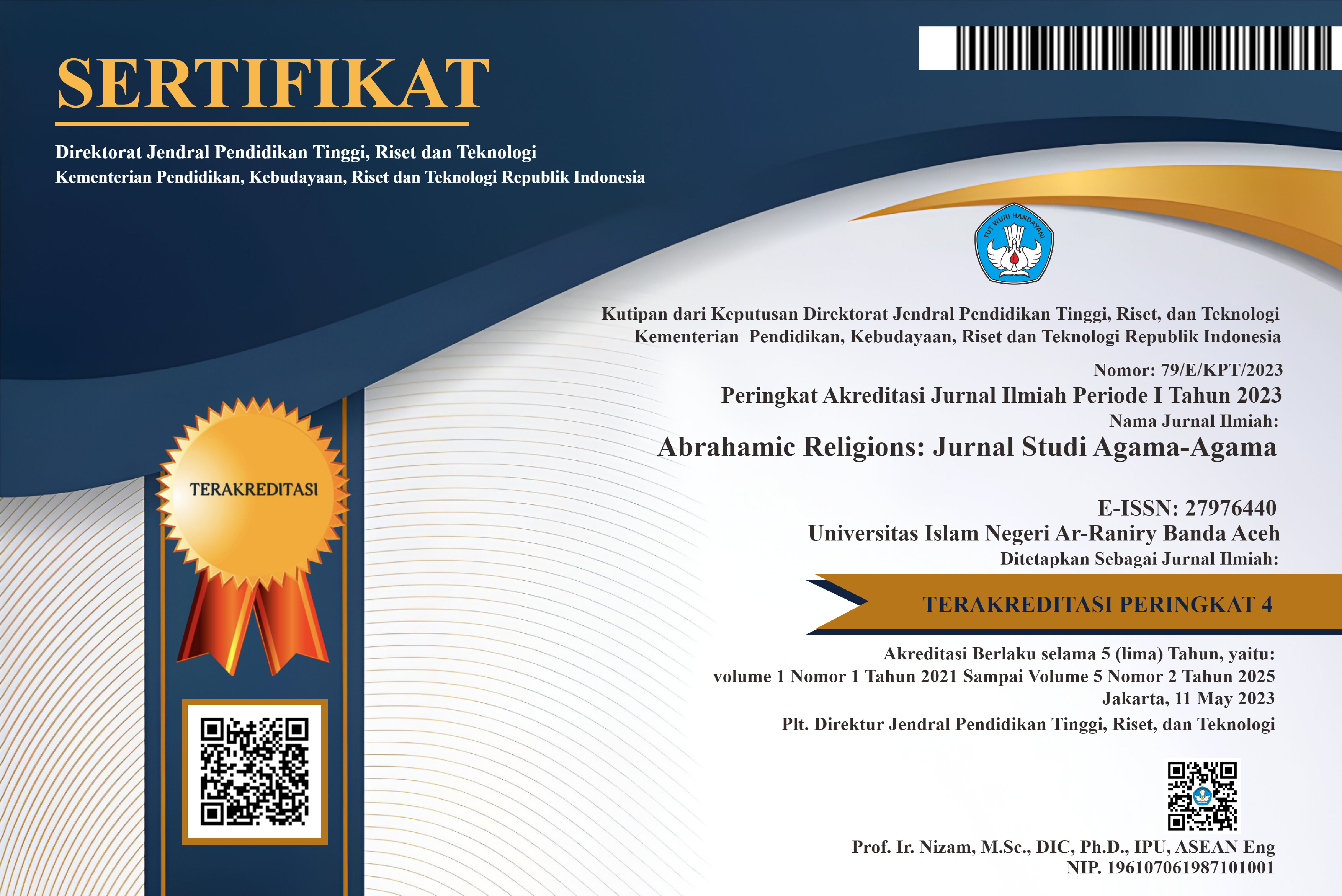Liberation Theology in Indonesia: The Role of Cak Nun and Maiyah Community in Social Transformation
Abstract
This article aims to examine the application of liberation theology in Indonesian Islam, focusing on the efforts of Muhammad Ainun Nadjib (Cak Nun) and the Maiyah Community Assembly, analyzed through Ali Shari’ati's concept of rausyanfikr. The study aims to explore how Cak Nun contextualizes Islam to address contemporary issues of injustice, oppression, and social alienation. Utilizing qualitative library research methods, it investigates various literary sources to evaluate the role of Islamic teachings in cultural and social emancipation. Findings indicate that Cak Nun and the Maiyah Community Assembly have played crucial roles in heightening community awareness about prevalent oppression, employing the Quran and Islamic thought as tools for liberation. The study concludes that Islam, as interpreted by Cak Nun, serves as an effective means for societal change, promoting a comprehensive application of Islamic teachings to address modern societal challenges. This research holds significant implications for scholars and practitioners interested in the intersections of religion and social transformation.
Keywords
Full Text:
PDFReferences
Abdillah, M. (1998). Alamsjah Ratu Perwiranegara; Stabilitas Nasional dan Kerukunan. Badan Litbang Agama RI.
Agustian, F. (2019). Sengkuni 2019 Bongkar Imajinasi dan Logika. Retrieved from https://www.caknun.com/teater/sengkuni2019/sengkuni2019-bongkar-imajinasi-dan-logika/
Ahmadi, R. (2017). Socio-Sufism of Orang Maiyah: Toward Human Sovereignty in Togetherness. AL-ALBAB, 6(2), 190. https://doi.org/10.24260/alalbab.v6i2.671
Alam, L., Lahmi, A., Alam, M., Aminah, & Ritonga, M. (2022). The Rise of the Urban Piety Movement: Jamaah Maiyah as an Urban Spiritualism and Emerging Religiosity in the Public Sphere. Jurnal Ilmiah Peuradeun, 10(3), 747-764. https://doi.org/10.26811/peuradeun.v10i3.711
Alamsyah, A. N., & Hasbullah, M. (2020). Pola Pengajian Kultur Ma’iyah Jamparing Asih di Bandung 2015-2018. Historia Madania, 4(1), 137. https://doi.org/10.15575/hm.v4i1.9191
Cahyo, A. N. (2018). Samudra Kearifan. Kaktus.
Faiz, Abd. A. (2019). Emha Ainun Nadjib dan Teologi Harmoni Sosial dalam Perspektif Sosiologi Agama. Jurnal Sosiologi Agama: Jurnal Ilmiah Sosiologi Agama dan Perubahan Sosial, 13(2), 5. https://doi.org/10.14421/jsa.2019.132-01
Hasman, A. (2019). Cinta, Kesehatan, dan Munajat Emha Ainun Nadjib. Bentang Pustaka.
Ian L. Betts. (2006). Jalan Sunyi Emha. Kompas Gramedia.
Jalaludin Rakhmat. (2016). Afkar Penghantar: Sekumpulan Pengantar. Nuansa Cendekia.
Latif, M. (2017). Teologi Pembebasan dalam Islam. Orbit Publishing.
Long, A. S. (2019). Ali Shari’ati dan Rausyanfikr: Menorot Idea Pahlawan Tidak Didendang. Prosiding Simposium Antarbangsa Falsafah Islam, 18.
Mukhtasar, M. (2000). Teologi Pembebasan Menurut Asghar Ali Engineer. Jurnal Filsafat, 31.
Muvid, M. B. (2020). Tasawuf Kontemporer. Amzah.
Nadjib, E. A. (2017). Anak Asuh Bernama Indonesia (DAUR I). Bentang Pustaka.
Nur Azizah, S. A. (2022). Teologi Pembebasan Hassan Hanafi Terhadap Penindasan Perempuan dalam Pandangan Angel Davis. JAQFI: Jurnal Aqidah Dan Filsafat Islam, 7(1).
Pratama, R. K. (2017). Maiyah sebagai Pendidikan Alternatif Sosial-Kemasyarakatan. Kapita Selekta, 4, 302.
Pratama, R. K. (2019). Lautan Jilbab sebagai Fenomena Kebudayaan. Retrieved from https://www.caknun.com/2019/lautan-jilbab-sebagai-fenomena-kebudayaan/
Redaksi. (2018). Pak Kanjeng. Retrieved from https://www.caknun.com/foto/mozaik/pak-kanjeng/
Siti Syamsiyatul Ummah. (2019). Teologi Pembebasan Ali Syari’ati (Kajian Humanisme Islam). ‘Anil Islam, 12(1), 302. https://doi.org/10.32939/ishlah.v2i2.8
Sudarman. (2015). Pemikiran Farid Esack tentang Hermeneutik Pembebeasan al-Qur’an. Al-Adyan, 9(1), 95.
Syari’ati, A. (1986). What Is To Be Done: The Enlightened Thinkers and an Islamic Renaissance.
Syari’ati, A. (1993). Ideologi Kaum Intelektual. Mizan.
Syari’ati, A. (2021). Paradigma Kaum Tertindas (S. Mahyudin, Ed.). Al-Huda.
Toto Rahardjo. (2011). Maiyah untuk Pembebasan. Retrieved from https://www.caknun.com/2011/maiyah-untuk-pembebasan/
Ungsaka, A. (2021). Mengembalikan Esensi Belajar untuk Anak-anak Kita. Retrieved from https://www.caknun.com/2021/mengembalikan-esensi-belajar-untuk-anak-anak-kita/2/
Zulkifli. (2021). Keniscayaan Metode Komprehensif dalam Studi Islam. Al-Kawakib, 2(2), 110-119. https://doi.org/10.24036/kwkib.v2i2
DOI: http://dx.doi.org/10.22373/arj.v4i2.23663
Refbacks
- There are currently no refbacks.
Copyright (c) 2024 Ilyas Alhafid Chrisanto

This work is licensed under a Creative Commons Attribution-ShareAlike 4.0 International License.
INDEX BY:

This work is licensed under a Creative Commons Attribution-ShareAlike 4.0 International License

.png)






.png)
1.png)
.png)

.png)










.png)


